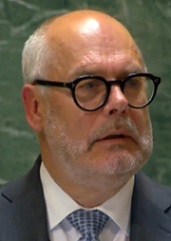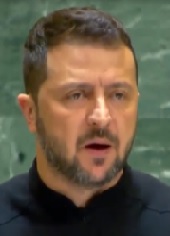Estonia
 – Alar Karis, President
– Alar Karis, President
ALAR KARIS, President of Estonia said: “I want to live in a world that is in peace,” where sovereign nations, whether big or small, are not conquered and colonized; where artificial intelligence serves and not hinders humanity; and where nobody has to fear oppression based on gender, race, nation beliefs or one's thoughts. Regrettably, peace and freedom are under threat, he said, noting that the number of countries where political rights and civil liberties are diminishing is more than twofold in comparison to those where such freedoms are improving. The international community may condemn brutal acts of violence but without efficient action against atrocities, it is not enough. What “keeps us awake at night”, he said, is the children who are lost to conflicts, who will never be old enough to see a high school diploma or learn how to ride a bike. The happiness of a child is the image that should set the moral compass of the international community, he said.
Stressing the importance of restoring the credibility of the UN, he said now more than ever it is vital to reform the Security Council. Commending the Pact for the Future as a good guideline, he said “we should have been even more ambitious”. The future Council must be efficient, open, and accountable and its composition must adequately reflect the current world. The scope and use of the veto right has to be limited, he said, expressing support for all efforts to limit its use, especially on actions aimed at ending or preventing mass atrocities. It is impossible to restore the credibility of the UN when a permanent Council member acts against the UN Charter principles, he said, adding “therefore, let us use wisely the powers of the General Assembly”. Calling on delegates to analyse options to ensure that the Assembly gains more prominence, he added that future peace operations must better respond to existing challenges and emerging realities.
The Russian Federation's aggression against Ukraine, he said, causes inhumane suffering, as does the war in Gaza and other conflicts. Since the horrific terrorist attack by Hamas against Israel almost a year ago, there has been too much suffering in Gaza and the region. The two-State solution is the only way to a just and lasting peace, he stressed. Noting how the global community has condemned the Russian Federation’s aggression against Ukraine “in this very room”, he said it must also firmly condemn the actions of those who arm that country in this aggression — Iran and Democratic People’s Republic of Korea. “Russia’s war against Ukraine is as clear as black and white. Russia is the aggressor and Ukraine is the victim,” he stressed, adding that the “smooth talk about dialogue” and calls on the two countries to engage in direct peace talks is only supporting the Russian Federation’s cause. “We are not going to call Russia for a coffee,” he said, calling on that country to accept Ukraine’s 10-point peace formula.
Highlighting his country’s “Fit for Freedom” proposal from last year, he said it calls for a global discussion on how to reinforce multilateralism, how to foster inclusive decision-making of all States, and how to ensure human rights and freedoms for all. Estonia’s own story is a perfect illustration that positive change is possible, he said, adding: “We have built a digital, cybersecure society where citizens feel that they themselves are the State.” While free societies might need “some updates from time to time and the latest plugins for optimized user-friendly performance”, if maintained properly they are not crashing and freezing like autocracies, he said. “Estonians have a vivid memory of the times when human rights were denied to us,” he said, adding that this makes the country vigorous, and reinforces its commitment to fighting for and to supporting those fighting for their rights today. As a candidate for the UN Human Rights Council for 2026-2028, it stands in alignment with the principle of universality and indivisibility of human rights.
Source: UN press release GA/12633
[ Full Text ]
Ukraine

– Volodymyr Zelenskyy, President
VOLODYMYR ZELENSKYY, President of Ukraine, recalling the beginning the Russian Federation’s full-scale invasion against his country — “a day that has already passed” — described the storming of Zaporizhzhia Nuclear Power Plant by the Russian Federation army as “one of the most horrifying moments of the war”. Lamenting about the continued occupation of the plant by the Russian Federation forces, he warned of a nuclear incident risk. “This is the major source of radiation danger in Europe, possibly in the world,” he stressed. He underscored that nuclear safety is the top priority in his Peace Formula, welcoming the adoption by the Assembly of a resolution demanding Moscow to return control of the nuclear power plant to Ukraine.
Turning to “the day that must never come”, he said the Russian Federation is trying “to break the spirit” of the Ukrainians by having destroyed all thermal power plants and a large part of the hydroelectric capacity. “This is how [Russian Federation President Vladimir V.] Putin is preparing for winter — hoping to torment millions of Ukrainians,” he said, warning that, according to his intelligence, Moscow plans attacks on nuclear power plants and their infrastructure, aiming to disconnect the plants from the power grid. Painting a grim picture of consequence of a possible nuclear disaster, he stressed that radiation will not respect State borders. “A day like that must never come,” he emphasized, urging the international community to put pressure on the aggressor.
Reflecting on Ukraine’s ongoing war efforts, he emphasized that “no just peace is possible without Ukraine”, as the Ukrainian people bear the full brunt of the conflict. Putting a spotlight on his Peace Formula — supported by nearly 100 nations — he said it offers “no veto right, no blocking authority” and ensures equality among nations — something that Moscow hates and cannot accept. He highlighted the failure of the Security Council in dealing with the war, noting that “too much depends on the veto power”, but expressed confidence in his Peace Formula, which prioritizes nuclear safety, energy security, food security, the return of prisoners of war and the protection of Ukraine’s territorial integrity.
Against that backdrop, he criticized “alternatives, half-hearted settlement plans” to the Peace Formula, adding that such attempts “not only ignore the interests and suffering of the Ukrainians”, but also give “Putin the political space to continue the war”. “Any parallel or alternative attempts to seek peace are, in fact, efforts to achieve a lull instead of an end to the war,” he asserted. “Everyone must understand — you will not boost your power at Ukraine’s expense,” he stated, appealing for a unified international response to ensure “a real and just peace” for Ukraine.
Source: UN press release GA/12634
[ Full Text ]
Comments powered by CComment